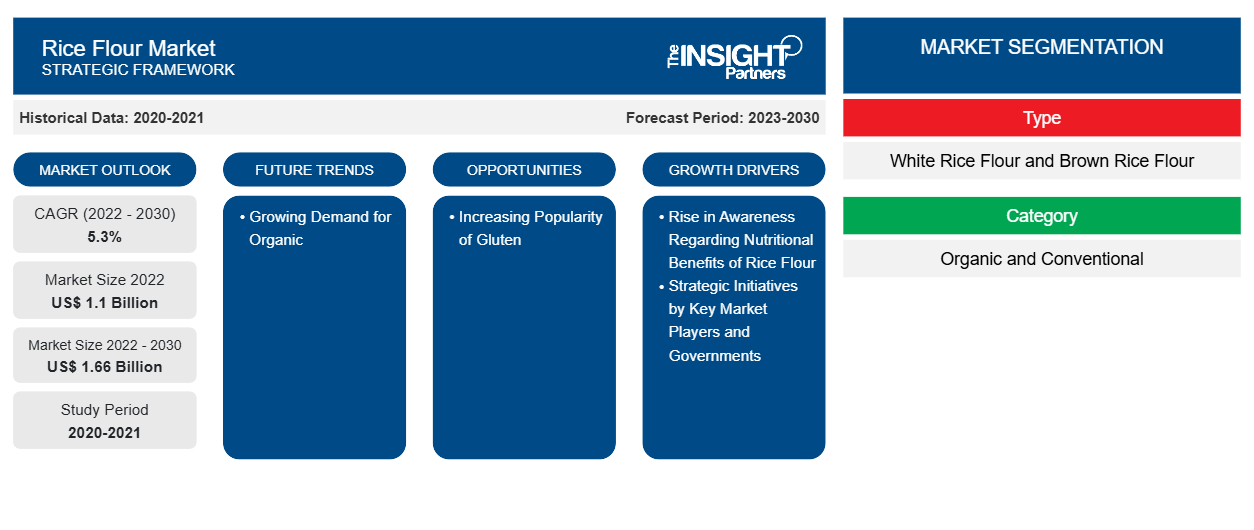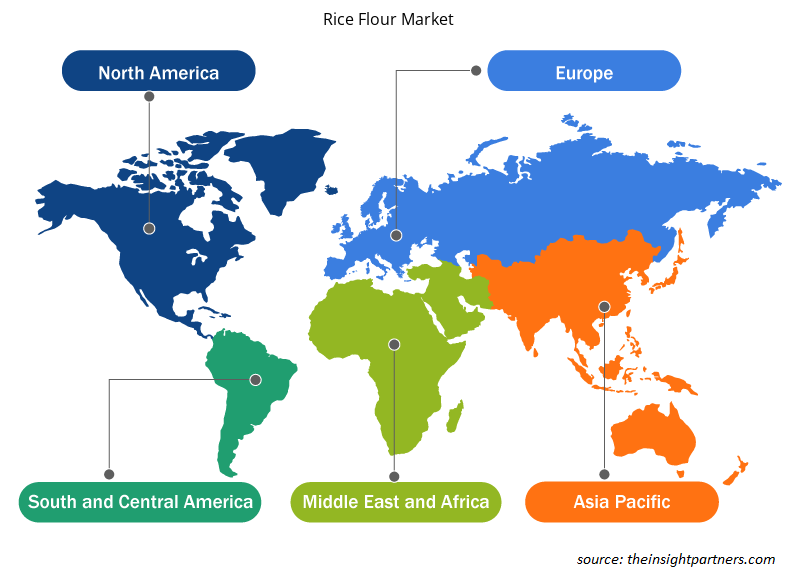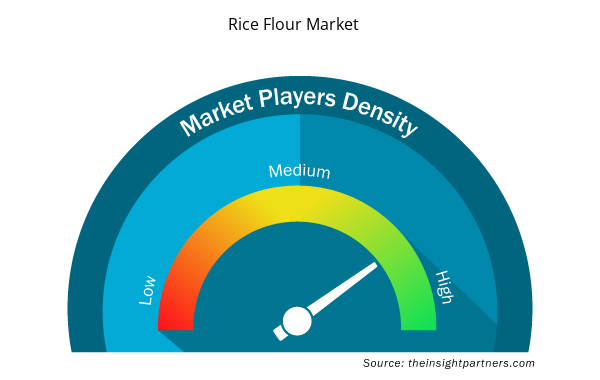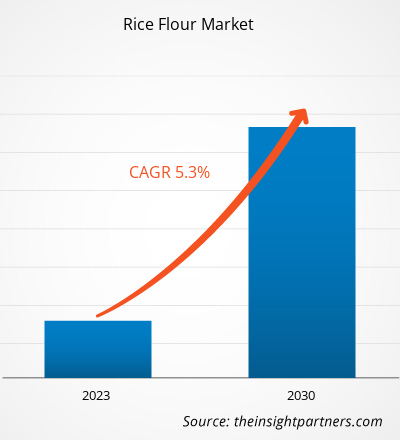[Research Report] The rice flour market size was valued at US$ 1,100.47 million in 2022 and is expected to reach US$ 1,655.82 million by 2030; it is estimated to register a CAGR of 5.3% from 2023 to 2030.
Market Insights and Analyst View:
Rice flour is prepared by grinding the rice kernels into coarse and fine powder. Rice flour is used as a substitute for wheat flour as they are free from gluten. Rising health concerns among consumers and the growing requirement for a gluten-free diet are boosting the growth of the rice flour market. Rice flour offers various health benefits, including improved digestive tract, boosted skeletal health, helps wound healing, and is beneficial for celiac patients. Rice flour is a rich source of vitamin C and contains antioxidants that are required for skin repair. Brown rice contains vitamin B, high protein content, and more fiber and antioxidants, whereas white rice is a rich source of empty calories. The nutritional benefits of sourced rice boost the demand for rice flour among various food & beverage manufacturers. Rice flour is a healthy ingredient used in many food products such as bakery and confectionery, sweet and savory snacks, beverages, and baby foods. It comes in three varieties—medium & short grain, long grain, and pre-gelatinized.
Growth Drivers and Challenges:
Rice flour is a healthy ingredient used in many food products such as bakery and confectionery, sweet and savory snacks, beverages, and baby foods. It comes in three varieties—medium & short grain, long grain, and pre-gelatinized. Rice flour is a rich source of vitamin C and contains antioxidants required for skin repair. Brown rice is a type of rice flour that contains vitamin B, high protein content, and more fiber and antioxidants, whereas white rice is a rich source of empty calories. The nutritional benefits of sourced rice boost the demand for rice flour among various food & beverage manufacturers. Choline, an essential nutrient for animals and humans, is found in rice flour. It aids in transporting cholesterol and triglycerides from the liver to the body. As a result, it has been linked to supporting liver health. Rice flour is rich in calcium content—10 mg in every 100 g of rice flour helps keep bones healthy. It helps maintain daily recommended intake levels when combined with other calcium-rich food, such as milk, cheese, tofu, and nuts. Hence, the increasing awareness regarding the nutritional benefits of rice flour among consumers is driving the market.
Rice flour is the primary ingredient and commodity used to manufacture various food and beverages. Any disruption in the supply chain of raw materials, such as rice, eventually increases rice flour prices. Supply fluctuations can be caused due to several factors, from weather, crop diseases, and pests to political and civil unrest and labor shortage. Also, manufacturers are making rice flour by milling long-grain rice at unreasonable prices to meet increasing demand. These factors lead to massive price hikes. One of the major challenges in the rice flour market is the unpredictable nature of grain prices due to climate change. Climate variability and seasonal fluctuation have a major impact on plants, reducing crop yields in various locations and eventually leading to input and price differences in production. For instance, long periods of dry weather hamper rice cultivation. Moreover, crop price fluctuation is caused by variable energy, chemical, and fertilizer costs. Rice price volatility is not novel, as commodity prices often fluctuate. However, the current rise in demand for rice, coupled with any disruption to or inadequate supply of rice, could dramatically impact the price of rice flour, thus, hampering the market growth.
Customize This Report To Suit Your Requirement
You will get customization on any report - free of charge - including parts of this report, or country-level analysis, Excel Data pack, as well as avail great offers and discounts for start-ups & universities
Rice Flour Market: Strategic Insights

- Get Top Key Market Trends of this report.This FREE sample will include data analysis, ranging from market trends to estimates and forecasts.
Customize This Report To Suit Your Requirement
You will get customization on any report - free of charge - including parts of this report, or country-level analysis, Excel Data pack, as well as avail great offers and discounts for start-ups & universities
Rice Flour Market: Strategic Insights

- Get Top Key Market Trends of this report.This FREE sample will include data analysis, ranging from market trends to estimates and forecasts.
Report Segmentation and Scope:
The global rice flour market is segmented into type, category, application, and geography. The rice flour market is segmented into white rice flour and brown rice flour based on type. The rice flour market is categorized organic and conventional based on category. Based on application the market is segmented into bakery and confectionery, beverages, sweet and savory snacks, baby food, breakfast cereals, and others. The global rice flour market is broadly segmented by geography into North America, Europe, Asia Pacific, the Middle East & Africa, and South & Central America.
Segmental Analysis:
Based on type, the rice flour market is bifurcated into white rice flour and brown rice flour. The brown flour segment is expected to register a higher CAGR during the forecast period. Unlike white rice flour, brown rice flour is made from whole-grain brown rice, retaining the bran and germ layers. As a result, brown rice flour contains higher levels of fibers, vitamins, minerals, and antioxidants than white rice flour. Increased awareness about the nutritional benefits of whole grains and the desire for healthier food options drive the demand for brown rice flour. Brown rice is naturally gluten-free and can be used in gluten-free baking and cooking as an alternative to wheat flour. Additionally, there has been a growing interest in whole foods and minimally processed ingredients as part of a healthy lifestyle. Brown rice flour, a whole grain product, aligns with this trend, and consumers might prefer it as a more nutritious option than refined flour. Also, brown rice flour is free from common allergens such as wheat, soy, dairy, and nuts. This makes it suitable for individuals with multiple food allergies or sensitivities. Furthermore, brown rice flour can be used in various culinary applications, including bakery, cooking, and thickening sauces. It can add a nutty flavor and a denser texture to recipes, enhancing the taste profile of dishes. All these factors are bolstering the brown rice flour market growth.
Regional Analysis:
Based on geography, the rice flour market is divided into five key regions: North America, Europe, Asia Pacific, South & Central America, and Middle East & Africa. The global rice flour market was dominated by Asia Pacific which accounted for US$ 435.44 Million in 2022. North America is a second major contributor holding more than 28% share in the global market. North America is also expected to register the considerable growth at a CAGR of over 6% over the forecast period. North America is one of the prominent regions comprising of strong and developed economies such as the US, Canada, and Mexico. The bakery industry is one of the most significant industries in North America, as bakery products are considered a staple food. According to the American Bakers Association, the bakery industry in the US has an average annual turnover of US$ 154 billion. Due to a hectic lifestyle and increasing preference for convenience food, the demand for cookies, cakes, pastries, muffins, and other bakery products is also rising. As the bakery industry is one of the major end users of rice flour, the market for rice flour is expected to grow in the coming years.
Industry Developments and Future Opportunities:
Various initiatives taken by the key players operating in the false eyelashes market are listed below:
- In April 2023, the Ministry of Agriculture, Food, & Rural Affairs (MAFRA), South Korea, moved to the next step of its national “Rice Product Development Project” by collaborating with 15 major local food and beverage firms. The ministry announced its plans to create 19 new rice-based products this year.
Rice Flour Market Regional Insights
The regional trends and factors influencing the Rice Flour Market throughout the forecast period have been thoroughly explained by the analysts at Insight Partners. This section also discusses Rice Flour Market segments and geography across North America, Europe, Asia Pacific, Middle East and Africa, and South and Central America.

- Get the Regional Specific Data for Rice Flour Market
Rice Flour Market Report Scope
| Report Attribute | Details |
|---|---|
| Market size in 2022 | US$ 1.1 Billion |
| Market Size by 2030 | US$ 1.66 Billion |
| Global CAGR (2022 - 2030) | 5.3% |
| Historical Data | 2020-2021 |
| Forecast period | 2023-2030 |
| Segments Covered |
By Type
|
| Regions and Countries Covered | North America
|
| Market leaders and key company profiles |
Rice Flour Market Players Density: Understanding Its Impact on Business Dynamics
The Rice Flour Market market is growing rapidly, driven by increasing end-user demand due to factors such as evolving consumer preferences, technological advancements, and greater awareness of the product's benefits. As demand rises, businesses are expanding their offerings, innovating to meet consumer needs, and capitalizing on emerging trends, which further fuels market growth.
Market players density refers to the distribution of firms or companies operating within a particular market or industry. It indicates how many competitors (market players) are present in a given market space relative to its size or total market value.
Major Companies operating in the Rice Flour Market are:
- PGP International Inc
- Ebro Foods SA
- Western Foods LLC
- Ingredion Inc
- CAREMOLI SpA
Disclaimer: The companies listed above are not ranked in any particular order.

- Get the Rice Flour Market top key players overview
Covid-19 Impact:
The COVID-19 pandemic initially affected the global rice flour market due to the shutdown of manufacturing units, shortage of labor, disruption of supply chains, and financial instability. The disruption of various industries due to the economic slowdown caused by the COVID-19 outbreak restrained the demand for rice flour. However, businesses are gaining ground as previously imposed limitations have been eased across various countries. Moreover, the introduction of COVID-19 vaccines by governments of different countries eased the situation, leading to a rise in business activities worldwide. Several markets witnessed growth after the ease of lockdowns and movement restrictions, including the rice flour market.
Competitive Landscape and Key Companies:
Some of the prominent players operating in the global false eyelashes market include PGP International Inc, Ebro Foods SA, Western Foods LLC, Ingredion Inc, CAREMOLI SpA, BELOURTHE SA, Kroner-Starke GmbH, Capitol Food Co, Ardent Mills LLC, Bay State Milling Co, Bob's Red Mill Natural Foods Inc, Gulf Pacific Rice Co Inc, Naturis SpA, Hometown Food Co, Koda Farms Inc, and Archer-Daniels-Midland Co among others.
- Historical Analysis (2 Years), Base Year, Forecast (7 Years) with CAGR
- PEST and SWOT Analysis
- Market Size Value / Volume - Global, Regional, Country
- Industry and Competitive Landscape
- Excel Dataset



Report Coverage
Revenue forecast, Company Analysis, Industry landscape, Growth factors, and Trends

Segment Covered
Type, Category, Application, and Geography

Regional Scope
North America, Europe, Asia Pacific, Middle East & Africa, South & Central America

Country Scope
Argentina, Australia, Brazil, Canada, China, France, Germany, India, Italy, Japan, Mexico, Russian Federation, Saudi Arabia, South Africa, South Korea, United Arab Emirates, United Kingdom, United States
Frequently Asked Questions
Rice flour is a healthy ingredient used in many food products such as bakery and confectionery, sweet and savory snacks, beverages, and baby foods. It comes in three varieties—medium & short grain, long grain, and pre-gelatinized. Rice flour is high in vitamin C and rich in antioxidants required for skin repair. Based on type, the rice flour market is bifurcated into white rice and brown rice. Brown rice contains vitamin B, high protein content, and more fiber and antioxidants, whereas white rice is a rich source of empty calories. The nutritional benefits of sourced rice boost the demand for rice flour among various food & beverage manufacturers. Choline, an essential nutrient for animals and humans, is found in rice flour. It aids in transporting cholesterol and triglycerides from the liver to the body. As a result, it has been linked to supporting liver health. Rice flour is rich in calcium content—10 mg in every 100 g of rice flour helps keep bones healthy. Incorporating rice flour in food and beverages aids in maintaining human health. It helps maintain daily recommended intake levels when combined with other calcium-rich food, such as milk, cheese, tofu, and nuts. Hence, the increasing awareness regarding the nutritional benefits of rice flour among consumers is driving the market.
In 2022, Asia Pacific region accounted for the largest share of the global rice flour market. The Asia Pacific rice flour market is segmented into China, India, Australia, Japan, South Korea, and the Rest of Asia Pacific. The growing influence of Western culture on consumers is influencing their food consumption habits. The young population consumes breakfast and quick meals in the form of bread, cookies, biscuits, pancakes, and other bakery products. Further, the demand for gluten-free bakery products is increasing as consumers are increasingly becoming health-conscious. Thus, the demand for rice flour is growing as it acts as a substitute.
The major players operating in the global rice flour market are PGP International Inc, Ebro Foods SA, Western Foods LLC, Ingredion Inc, CAREMOLI SpA, BELOURTHE SA, Kroner-Starke GmbH, Capitol Food Co, Ardent Mills LLC, Bay State Milling Co, Bob's Red Mill Natural Foods Inc, Gulf Pacific Rice Co Inc, Naturis SpA, Hometown Food Co, Koda Farms Inc, Archer-Daniels-Midland Co, among others.
Organic and Fairtrade-certified rice flour has been witnessing strong demand in the global market owing to consumer inclination toward safer and healthier products that help maintain overall health. Further, there has been an abrupt increase in sales of rice flour that are both fairtrade and organic-certified. The rising preference for pesticide-free food products positively affects the demand for organically grown rice commodities.
The increasing popularity and acceptance of organic rice flour is one of the significant trends in the global market. Organic rice flour is made from organically grown rice cultivated as per the rules & guidelines provided by the authorized organizations. Organic rice is cultivated without chemicals, pesticides, synthetic fertilizers, or other harmful agents. An increase in consumer awareness about organic products and strong public support for developing natural and nutritionally rich products are driving the demand for organically grown rice. Further, the demand for organic rice flour is increasing among various application industries such as bakery & confectionery, sweet & savory products, beverages, and baby food. Thus, the escalating demand for organic rice flour is expected to positively influence the rice flour market growth during the forecast period.
Based on the category, the organic segment is predicted to register a higher CAGR during the forecast period. Organic rice flour refers to rice flour that is produced from organically grown rice. Organic rice flour is free from synthetic fertilizers, pesticides, and other potentially harmful chemicals that may be used in conventional rice farming. Consumers concerned about chemical residues in their food may choose organic rice flour as a safer and more natural option. Also, some believe that organic foods, including organic rice flour, may offer greater nutritional value and health benefits than conventionally grown counterparts. Moreover, organic rice flour is certified according to specific organic standards and regulations. This certification ensures the consumers that the product meets the established criteria for organic production. These factors are surging the demand for organic rice flour.
Based on the type, the brown rice flour segment is expected to register the highest CAGR during the forecast period. Unlike white rice flour, brown rice flour is made from whole-grain brown rice, retaining the bran and germ layers. As a result, brown rice flour contains higher levels of fibers, vitamins, minerals, and antioxidants than white rice flour. Increased awareness about the nutritional benefits of whole grains and the desire for healthier food options drive the demand for brown rice flour. Brown rice is naturally gluten-free and can be used in gluten-free baking and cooking as an alternative to wheat flour.
Additionally, there has been a growing interest in whole foods and minimally processed ingredients as part of a healthy lifestyle. Brown rice flour, a whole grain product, aligns with this trend, and consumers may prefer it as a more nutritious option than refined flour. Also, brown rice flour is free from common allergens such as wheat, soy, dairy, and nuts. This makes it suitable for individuals with multiple food allergies or sensitivities. Furthermore, brown rice flour can be used in various culinary applications, including bakery, cooking, and thickening sauces. It can add a nutty flavor and a denser texture to recipes, enhancing the taste profile of dishes. All these factors are bolstering the brown rice flour market growth.
Trends and growth analysis reports related to Food and Beverages : READ MORE..
The List of Companies - Rice Flour Market
- PGP International Inc
- Ebro Foods SA
- Western Foods LLC
- Ingredion Inc
- CAREMOLI SpA
- BELOURTHE SA
- Kroner-Starke GmbH
- Capitol Food Co
- Ardent Mills LLC
- Bay State Milling Co
- Bob's Red Mill Natural Foods Inc
- Gulf Pacific Rice Co Inc,
- Naturis SpA
- Hometown Food Co
- Koda Farms Inc
- Archer-Daniels-Midland Co

 Get Free Sample For
Get Free Sample For